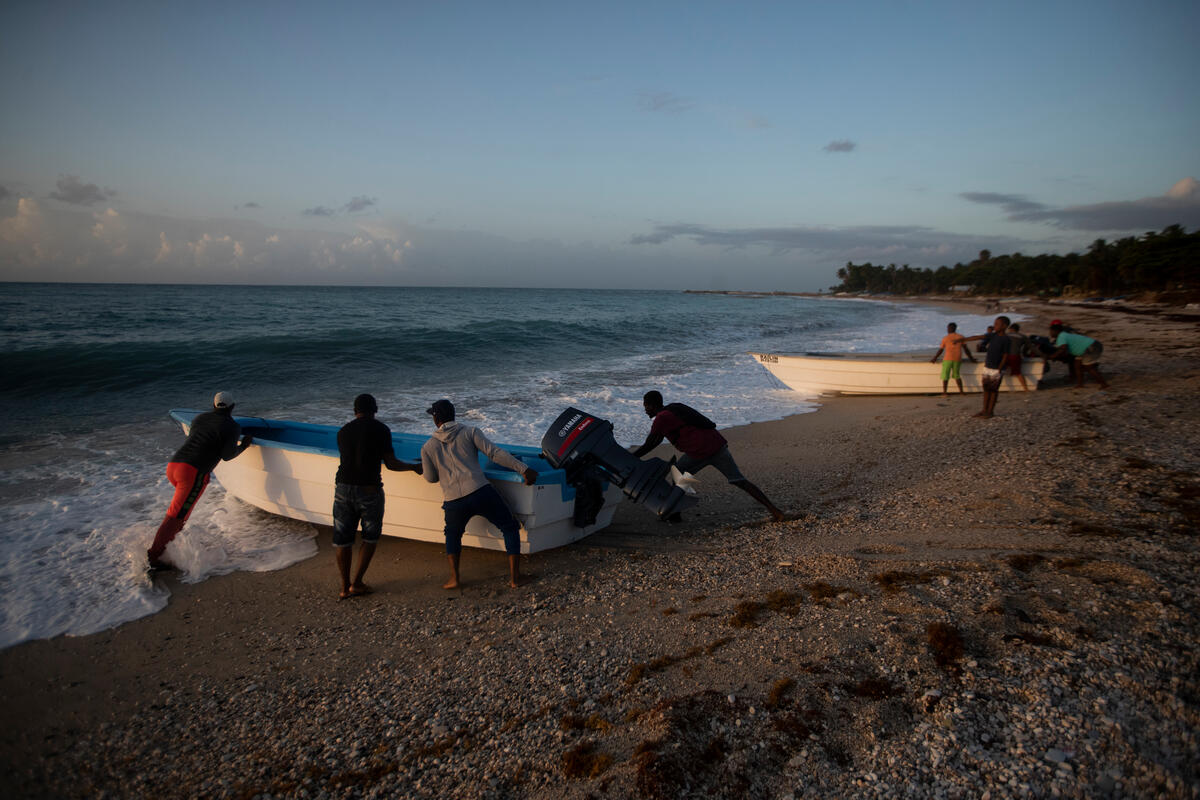Integrating social protection into climate action in the Caribbean

©FAO/Erika Santelices
As the impacts of climate change intensify, the Caribbean faces a range of increasing risks from more intense hurricanes to changing rainfall patterns and extreme heat. Without urgent action these will have severe consequences for the region’s most vulnerable populations.
The integration of social protection systems and climate action has emerged as a vital tool to build resilience, adapt to changing conditions and safeguard livelihoods in response to the impacts of both climate change and climate policies on poor and vulnerable people. Recently, the Food and Agriculture Organization of the United Nations (FAO) and UNICEF supported Barbados and Grenada in laying the groundwork for a holistic approach that links social protection to climate commitments. This ‘deep dive’ in the two countries was part of a broader effort to support Caribbean countries strengthen their social protection systems to address and adapt to climate challenges, particularly in the context of the upcoming revision of Nationally Determined Contributions (NDCs) under the Paris Agreement.
The importance of aligning social protection with climate action
Social protection programmes —like cash transfers, public works programmes —play a critical role in reducing poverty and inequality. But their importance goes beyond economic support; these programmes can also be key instruments for climate adaptation, climate mitigation and disaster risk management. For example, by addressing vulnerabilities and enhancing resilience, social protection can reduce the economic impacts of climate shocks on communities, such as those caused by hurricanes or prolonged droughts. By combining regular cash transfers with complementary services - such as training and skills on climate-smart agricultural practices – they enable people to adapt their livelihoods to longer-term changes in the climate.
Governments around the world are committed to revising their NDCs—national commitments to reduce greenhouse gas emissions and adapt to climate change—by 2025, and this represents a critical window of opportunity for countries to embed social protection into climate action going forward. Integrating social protection into NDCs therefore offers a pathway for countries in the Caribbean to ensure that climate policies address the needs of vulnerable populations, making this a key element of their efforts for an effective climate action.
Building Momentum in Barbados and Grenada
To support this process, FAO and UNICEF facilitated a series of workshops and interministerial dialogues between government ministries in Barbados and Grenada in November 2024. Building on a regional event held in May 2024, which brought together 14 Caribbean countries to promote coherence between the social protection and climate agendas, activities in both countries aimed to deepen understanding, encourage cross-sector collaboration and identify concrete opportunities to incorporate social protection in revised NDCs. Representatives from the Regional Collaboration Centre (RCC) for the Caribbean of the United Nations Framework Convention on Climate Change (UNFCCC) also joined sessions in both countries to support the process and align it with wider regional efforts to support countries in developing their revised climate strategies.
In Barbados, discussions between the Ministry of People Empowerment and Elder Affairs (MPEA) and the Ministry of Environment and National Beautification (MENB) centred on the country’s ongoing NDC revision process. Participants reflected on the socioeconomic risks posed by climate change and how existing programs could be strengthened to address these challenges. The dialogues revealed strong support for incorporating social protection into the updated NDCs, as well as an interest in fostering greater collaboration between key ministries, such as those responsible for agriculture, labour and housing.
In Grenada, representatives from the Ministry of Social and Community Development (MSCD) and the Ministry of Climate Resilience, the Environment, and Renewable Energy (MCRE) drew on lessons learned during the response to Hurricane Beryl in July to reflect on the importance of building social protection systems that support longer-term resilience and adaptation as well as short-term shock response. Participants emphasised the importance of robust data collection and management to better understand climate vulnerabilities and improve program targeting. There was also agreement on the need for sustained collaboration between government ministries, civil society and other key stakeholders to integrate social protection into the NDCs and ensure Grenada’s approach to climate action is inclusive of the whole population.
What next
The interministerial dialogues in Barbados and Grenada represent an important step forward in aligning social protection systems with climate action in the Caribbean region. By fostering collaboration across ministries and building capacity at the intersection of social protection and climate policy, FAO and UNICEF are supporting Caribbean nations in developing innovative strategies to protect their most vulnerable populations from climate risks. As the countries in the region prepare to update their NDCs, these efforts could serve as a model for other Small Island Developing States (SIDS) and for low- and middle-income countries seeking inclusive, long-term and people-centred solutions to the climate crisis.
The insights from the 'deep dive' emphasize that tackling the climate crisis in the Caribbean goes beyond reducing emissions, given the region's minimal contribution to global greenhouse gas emissions. More importantly, it focuses on protecting vulnerable populations and enhancing livelihoods, particularly for those most at risk. By fostering ongoing partnerships, knowledge exchange, and collaboration, there is hope for a future where Caribbean communities can prosper despite the challenges of a changing climate.
Elearning course: Managing climate risks through social protection
Scoping review - The role of social protection in facilitating climate change adaptation and mitigation for economic inclusion among rural populations
Social Protection, a Key Solution for Directing Climate Finance To Poor Small-Scale Farmers
All about Nationally Determined Contributions
